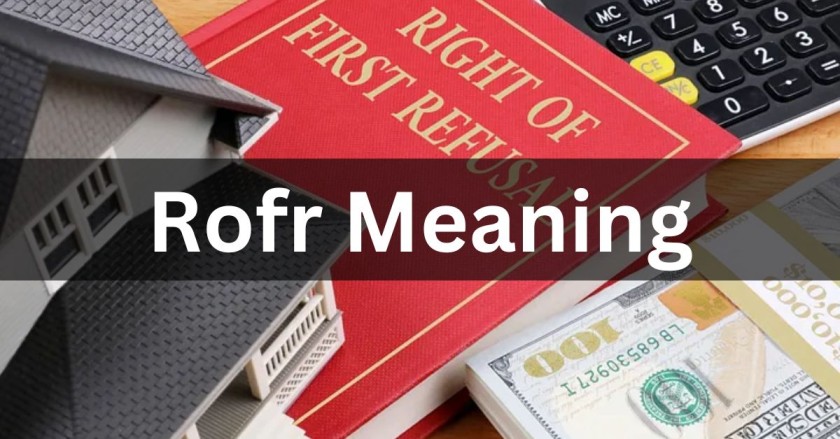ROFR, or First Right of Refusal, plays a crucial role in shaping the future opportunities for your startup. Widely utilized in the real estate sector, this clause grants lessees the priority to acquire properties they desire.
As an obligor, your ability to consider alternative offers is restricted until the ROFR holder decides not to exercise their right. This limitation may prevent you from exploring potentially better offers from external parties.
It is essential to thoroughly comprehend the nuances of ROFR, including its definition, functioning, and the implications it holds for your startup. Keep reading to gain a comprehensive understanding of this aspect!
Right of First Refusal (ROFR) Meaning:

ROFR is an agreement that grants the holder the exclusive right to present the first offer or engage in a transaction with your startup before other potential parties. This clause is commonly associated with assets, such as a rental tenant seeking to purchase the property they currently occupy from the landlord.
A lessee with ROFR possesses the privilege to submit the initial offer for the property, especially when the owner decides to sell it, effectively preceding other prospective buyers. Even if other parties express interest in acquiring the property, the ROFR holder retains the right to proceed with the purchase.
The property owner or seller can only entertain alternative offers when the ROFR holder chooses not to exercise their right. ROFR serves as a valuable incentive for lessees in buyer’s markets and also functions as a strategic estate planning tool, mitigating conflicts arising from inheritance within family members.
If you are a contingent buyer subject to a kick-out clause, having a ROFR can offer significant advantages. In summary, a ROFR clause imposes an obligation on the seller to present the property listing to the rights holder before considering competing offers from external parties.
What is the Purpose of ROFR?
Many commercial leases incorporate provisions designed to provide businesses with increased security in scenarios where landlords list the rented property for sale or face financial challenges.
For venture capital investors, ROFR becomes a strategic tool for acquiring either the entire company or favorable rates on stocks. Contrary to common knowledge, holding a ROFR and patiently waiting for the opportune moment can prove more lucrative than an immediate asset purchase.
Joint venture business partners often share the first right of refusal, preventing external entities from acquiring shares in the company when one partner decides to sell.
Similar principles apply to shareholder contracts in the private sector; for example, a publisher might hold the right of first refusal for a new author’s forthcoming books.
In situations where there is no existing right of first refusal for a company or property, the seller can grant it to the initial buyer, who may also request it, or strategically use it as an incentive to attract potential buyers.
Also Read: Glútem – A Comprehensive Guide
How does the Right of First Refusal Work?
The right of first refusal operates similarly to option contracts, granting the holder the exclusive right to engage in transactions with your business, particularly those involving assets, before others can do so.
Individuals seeking the right of first refusal typically wish to observe the development of an opportunity or business, opting to participate in the transaction at a later stage rather than committing immediately.
In such instances, the right of first refusal provides them with an excellent avenue to accomplish their objectives.
Customizing ROFR clauses allows for the inclusion of standard agreement variations, enabling both parties to introduce necessary modifications, including contract duration and the grounds on which the rights holder can designate a third party to exercise the right.
Like other legal clauses, ROFRs are time-bound, and the seller gains the ability to explore alternative offers once the stipulated timeframe expires.
What are the Pros and Cons of the Right of First Refusal?
ROFR operates as an insurance policy for the rights holder, providing reassurance that they won’t forfeit rights to a desired asset.
For instance, a commercial lessee facing the risk of eviction by a new buyer may secure the option to purchase the rented property by negotiating the inclusion of the right of first refusal in their lease.
In such circumstances, incorporating the right of first refusal into the lease grants the tenant the exclusive right to acquire the property before other potential buyers, especially when leasing becomes an untenable option.
Conversely, the right of first refusal limits the property owner’s ability to negotiate with third-party buyers, who may offer competitive prices driven by a bidding war among themselves.
How can you get a Right of First Refusal?
Developing a ROFR clause entails addressing contractual legalities, necessitating the involvement of your attorney. Typically, the process involves the engagement of two lawyers—one representing your interests and the other representing the property owner.
In this process, the seller specifies the selling price, allowing both legal representatives time to negotiate and ensure fairness for all parties involved.
What is the Ideal Time to use the Right of First Refusal?
The right of first refusal is a commonly used clause by renters who may have an interest in purchasing the property in the future.
This typically occurs when the lease expires, the owner decides to sell, or faces financial challenges. The clause grants the renter the privilege to present the initial offer for the property before the owner entertains offers from other parties.
ROFR serves to mitigate potential chaos and conflicts, particularly among family members dealing with inheritance matters.
What are Alternatives to the First Right of Refusal?
The Right of First Offer, also referred to as the Right of First Negotiation, stands as a viable alternative to the ROFR. Unlike the latter, the Right of First Offer imposes more restrictions on the rights holder.
In this scenario, the holder is granted the privilege to propose their offer instead of simply accepting the transaction on identical terms. Meanwhile, the obligor retains the freedom to either accept or decline the offer and can proceed to engage with a third party under different terms.
What are the Consequences of Violating ROFR Contract Terms?
As ROFR is a legal agreement, any breach of its terms carries consequences in accordance with contract law. If the holder is denied the right of refusal, they have the option to file a lawsuit against the seller, seeking either specific performance or financial damages.
Specific performance compels the violating party to adhere to the terms of the contract. For example, if the holder was deprived of their right before a third party concluded the transaction, they may regain the opportunity to exercise their rights, such as purchasing the property on the originally agreed terms.
In situations where specific performance is not feasible due to state laws or other circumstances, the holder may pursue monetary damages. These funds are intended to compensate them for the inconvenience and loss of opportunity resulting from the breach.
Right of First Refusal (ROFR) – Key Takeaways:
A right of first refusal (ROFR) is a legal agreement that grants the holder the exclusive privilege to engage in transactions with the other party before anyone else. It serves as a safeguard to ensure that the rights holder does not lose the opportunity to transact when the counterparty decides to sell a specific asset.
However, it’s important to note that ROFR may impose limitations on the potential profits of the asset owner, as they can only sell the right to transact with third parties if the rights holder opts not to exercise their privilege.
As a business owner leasing a property, you are likely to derive significant benefits from this clause. However, the dynamics change when it comes to selling your company’s stock.
FAQ’s
1. What does ROFR stand for?
ROFR stands for Right of First Refusal.
2. What is the purpose of ROFR?
ROFR grants the holder the exclusive right to make the first offer or engage in a transaction before other potential parties, commonly used in real estate and business acquisitions.
3. How does ROFR work?
It gives the holder the exclusive right to engage in transactions involving assets before others, allowing observation and participation at a later stage.
4. What are the pros and cons of ROFR?
Pros: Acts as insurance for rights holders, prevents potential eviction risks. Cons: Limits property owners’ negotiations with third-party buyers.
5. How can you get a ROFR?
Developing a ROFR clause involves legal considerations and requires attorneys representing both parties to negotiate contractual terms.
6. When is the ideal time to use ROFR?
ROFR is commonly used by renters interested in purchasing the property when the lease expires, the owner decides to sell, or faces financial challenges.
7. What are alternatives to ROFR?
The Right of First Offer (ROFO) is an alternative, granting the rights holder the privilege to propose their offer before others.
8. What are the consequences of violating ROFR terms?
Violating ROFR terms may lead to legal consequences, including specific performance or financial damages sought by the rights holder.
Conclusion:
Understanding the nuances of ROFR is crucial for businesses, offering a strategic advantage in property transactions. While it safeguards rights holders, it’s essential to navigate its limitations for effective decision-making in various business scenarios.
Also Read:
- Amazons Gpt44x – A Revolution in AI Technology In 2024
- Rushada – A Comprehensive Exploration of Holistic Well-being In 2024
- Teleportation Terraria – Unlocking the Mysteries In 2024
